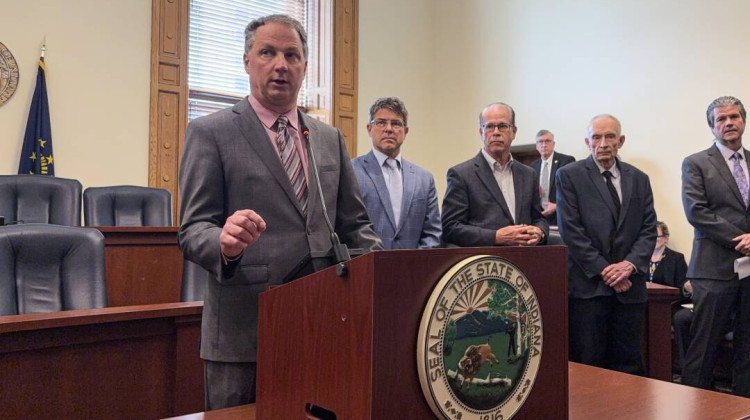
Indiana's legislative session started Jan. 6 and is expected to wrap up in late April.
Steven Van Elk / UnsplashIn addition to the normal flurry of legislation filed early in Indiana’s general session, lawmakers are on the hook this year with creating the state’s biennial budget.
Senators and representatives from Southern Indiana districts have so far filed legislation on Medicaid, voting, sex education and oversight for sheriffs and other elected officials.
Here are some of their priorities this session:
Republican Sen. Chris Garten, District 45, joined others in authoring a bill that would put checks on state contracts. Senate Bill 5 would require state agencies to provide contracts to be added to Indiana’s transparency website within 30 days of execution and provide quarterly updates on active contracts. It would also put checks on contractors with complaints and on proposals that would increase the contract time or length by certain amounts.
Senate Bill 11 would restrict minors’ use of social media sites without first getting parental permission. This comes amid the on again off again national ban on TikTok.
Senate Bill 2 requires an annual report to a Medicaid oversight committee by the office of the secretary of Family and Social Services, and calls for verification of factors including income and other coverage to be part of the Medicaid program.
It would also cap enrollment in the Healthy Indiana Plan at 500,000 people, and include work requirements to participate.
Republican Sen. Gary Byrne, from District 47, has outlined legislative priorities including bills related to the state’s abortion restrictions. Senate Bill 170 prohibits the state or a political subdivision from helping a person seek or get an abortion, unless it is necessary to save the life of the pregnant person. It says the state can, however, inform the person about abortion alternatives.
Senate Bill 171 makes it a misdemeanor to prescribe or send an abortion-inducing drug to a pregnant person in Indiana, which goes up to a level 6 felony if there are subsequent instances of doing so. The bill would also prevent nonprofit organizations operating, registered or providing services in the state to provide or offer to provide financial assistance for an abortion-inducing drug.
Abortion is illegal in Indiana except in cases deemed medically necessary for the pregnant person, in cases of rape or incest or fatal fetal anomaly.
Senate Bill 171 would also require a person seeking an abortion under the rape exception to provide an affidavit confirming that.
Senate Bill 441 would reverse birth certificates on which gender has been changed by court order.
Senate Bill 442 would govern sex education in schools, by requiring the school’s governing body to first approve materials and to publish information about the material on the school website.
Senate Bill 235 would add “prohibitions and requirements” on health licensing boards, state agencies, education systems and others regarding diversity, equity and inclusion policies.
Byrne also wants to limit early, in-person voting to one week with Senate Bill 284. Senate Bill 287 would make school board races partisan, with candidates required to run in the primary election.
Republican Rep. Zach Payne, of District 66, has authored bills that would freeze property taxes for people 65 and older with House Bill 1656, and eliminate state individual adjusted gross income tax with House Bill 1651.
House Bill 1654 would legalize cannabis for people 18 and older, with exceptions for people under 18 if they have a medical cannabis card. It would also exempt people with medical cannabis cards from paying state sales tax on it.
House Bill 1393, which Payne co-authored, would require officers to provide the name, address and other identifying information to U.S. Customs and Immigration Enforcement after they arrest or issue a summons to a person they believe is residing in the country illegally.
Republican Rep. Karen Engleman, of District 70, has introduced legislation that would dissolve township government in all counties except Marion. House Bill 1233 would also dissolve fire protection districts and territories. County government would be in charge of township assistance and fire protection services under a county fire protection and medical services plan.
House Bill 1633, which Engleman co-authored, would move elections of city and town officials to even numbered years.
House Bill 1079, which she also co-authored, is one of multiple “squatters” bills between the House and Senate this year. This one allows for expedited removal of a person on residential or commercial property who has never had a rental agreement or permission, though some other bills specify that as 48 hours.
Critics say the bills limit tenants’ rights and criminalize homelessness.
Democratic Rep. Wendy Dant Chesser, of District 71, has introduced legislation that would end straight-party voting with House Bill 1560. She’s also proposed a bill that would incentivize employers to contribute to the cost of child care for employees with House Bill 1430.
She’s also introduced multiple pieces of legislation aimed at increasing oversight and training for local elected officials.
House Bill 1227 calls for sheriffs to provide information on jail commissary spending to the county fiscal body monthly, rather than the current twice yearly. House Bill 1429 would require local elected officials to complete ethics training.
Dant Chesser announced in October an upcoming legislative package that would increase training, transparency and oversight in the wake of the felony conviction of former Clark County Sheriff Jamey Noel.
House Bill 1225 requires prosecutors to take action to garnish state police benefits when someone who receives them is ordered to pay restitution.
Republican District 72 Rep. Ed Clere’s priorities this session include bills addressing health care, education and government oversight.
House Bill 1106 would change requirements for participating in the state’s Medicaid buy-in program, including removing income as a determination for eligibility and increasing the maximum age for participation to 67. It would also raise the maximum monthly sliding scale premiums to $500, from $275.
House Bill 1306, which Clere co-authored, would increase the maximum income tax credit for teachers’ classroom supplies to $300 from the current $100.
House Bill 1392 outlines the timing of salary increases for state elected officials, and requires state agencies to upload copies of contracts to Indiana’s transparency website within 60 days of execution.
Clere also co-authored several bills introduced by Dant Chesser, including House Bill 1431, which would require counties to publish campaign finance reports on a county website.
This year’s legislative session is expected to wrap up in late April. For more information and to check the progress of bills, check here.
Coverage of Southern Indiana is funded, in part, by Samtec Inc., the Hazel & Walter T. Bales Foundation, and the Caesars Foundation of Floyd County.
 DONATE
DONATE






 Support WFYI. We can't do it without you.
Support WFYI. We can't do it without you.